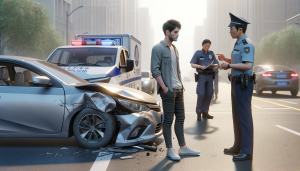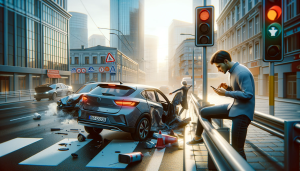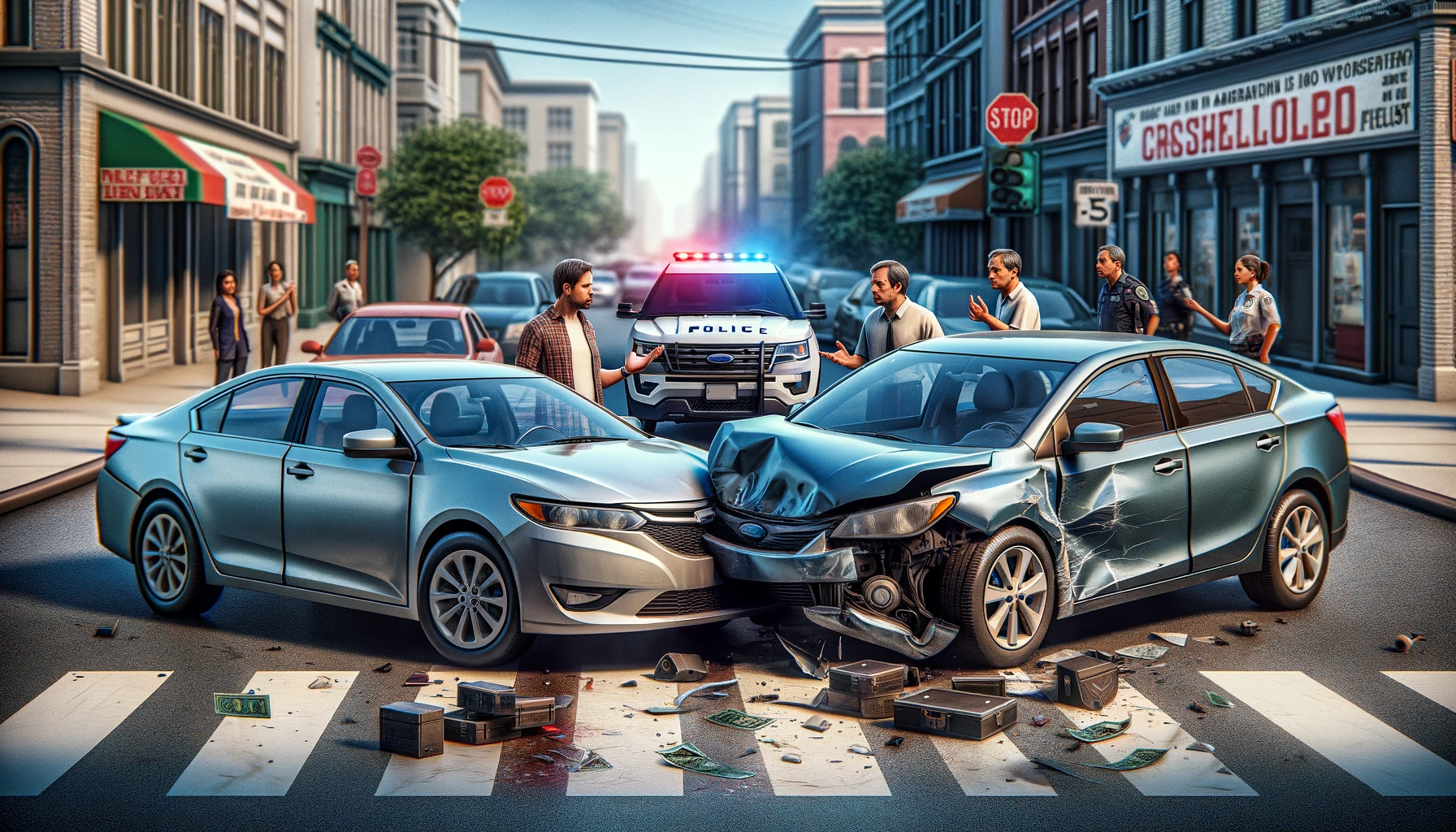Introduction
Being involved in a
car accident is a life-altering event that can bring confusion, stress, and uncertainty. If you’re facing this challenge without a driver’s license, the situation might seem even more overwhelming. You may wonder if your lack of a license disqualifies you from seeking justice or compensation. The answer is clear: you still have the right to sue for damages and hold the responsible party accountable for their negligence.
This comprehensive guide will help you navigate the legal process, dispel myths about unlicensed drivers, and equip you with the knowledge to protect your rights. From understanding how fault is determined to exploring the importance of police reports and witness statements, we’ll cover everything you need to build a strong case. Whether you’re an unlicensed motorist, pedestrian, or passenger, this article is designed to empower you with the tools to seek the justice and compensation you deserve.
Can You File a Lawsuit Without a Driver’s License?
A lack of a driver’s license doesn’t prevent you from filing a lawsuit. The legal system focuses on determining fault and negligence in accidents, rather than penalizing individuals for not having a license. Contrary to common belief, being unlicensed does not bar you from seeking compensation for your injuries, property damage, or other losses.
It’s important to remember that driving without a valid license may lead to separate legal issues, such as fines or citations, but these are unrelated to your right to file a claim. The courts are primarily concerned with whether the other party caused the accident and whether you can prove their negligence.

Do You Need a License to Be Protected by Law?
The law protects everyone on the road, regardless of their licensing status. This includes pedestrians, cyclists, passengers, and even unlicensed motorists. If another person’s careless or reckless behavior caused your injuries, you are entitled to compensation for your medical expenses, lost wages, and pain and suffering.
For instance, if a driver runs a red light and hits your vehicle, their negligence is the critical factor in the case—not whether you held a valid driver’s license at the time. Legal protections are in place to ensure that everyone, licensed or not, has access to justice when they are wrongfully injured.
Fault is the cornerstone of any car accident lawsuit. To win your case, you must demonstrate that the other party acted negligently, leading to the accident and your subsequent injuries. Negligence could involve a range of behaviors, such as speeding, distracted driving, running a stop sign, or failing to yield the right of way.
Proving fault often requires a combination of evidence, including police reports, witness statements, photos, and expert testimony. Working with an experienced attorney can help you gather and present this evidence effectively, strengthening your case.
In many accidents, fault is not entirely clear-cut. Comparative negligence comes into play when both parties share some level of responsibility for the accident. For example, if you were speeding but the other driver failed to signal a lane change and caused the collision, you might both bear some fault.
In jurisdictions that follow comparative negligence rules, your compensation is reduced by the percentage of fault attributed to you. For instance, if you are found 20% responsible and your damages total $100,000, you would receive $80,000 after the reduction. Understanding this concept is crucial for setting realistic expectations about your potential recovery.
Factors That Impact Your Case
Several factors can influence the outcome of your lawsuit, including:
- Severity of Injuries: Cases involving significant injuries, such as fractures, spinal damage, or traumatic brain injuries, often result in higher compensation due to increased medical costs and long-term impacts.
- Strength of Evidence: Clear and convincing evidence, such as video footage, police reports, and medical records, can significantly strengthen your case.
- Witness Testimony: Reliable witnesses can corroborate your version of events, adding credibility to your claims.
- Legal Representation: Having an experienced attorney can make a significant difference, as they can navigate legal complexities and advocate on your behalf.
Role of Police Reports
Police reports are a cornerstone of
car accident cases. These reports are often viewed as unbiased accounts of the incident and may include crucial details such as:
- Descriptions of the Accident: The report typically outlines how the accident occurred, including diagrams of the scene.
- Statements from Drivers and Witnesses: Police officers often interview involved parties and witnesses, recording their accounts.
- Citations or Violations: If one party was issued a citation (e.g., for running a red light), it can support your claim of negligence.
While not admissible in all courts as direct evidence, police reports can guide settlement negotiations and provide a foundation for your case.
Witness Statements and Their Importance
Witnesses are invaluable in
car accident cases, especially when liability is disputed. A credible witness can provide an impartial account of the events leading up to the accident, often confirming critical details that bolster your claims.
For example, if a witness saw the other driver texting moments before the collision, their testimony can establish negligence. Witness statements can also clarify conflicting versions of the incident, helping to create a clearer picture of what happened. Collecting witness contact information at the scene is vital, as their statements may be pivotal in securing a favorable outcome.
Can You Be Penalized for Driving Without a License?
Driving without a license is a legal issue separate from your civil lawsuit for damages. While you may face penalties such as fines, citations, or even court-mandated programs, these consequences are part of a criminal case and do not necessarily affect your ability to sue in a civil court. However, it’s important to address any legal penalties promptly, as failing to do so might complicate other aspects of your case. Remember, the civil court’s primary concern is determining liability for the accident, not your licensing status.
Criminal vs. Civil Cases: Key Differences
Understanding the distinction between criminal and civil cases is crucial in navigating legal challenges.
- Criminal Case: This deals with the penalties for driving without a license. It focuses on whether you violated traffic laws and what punishments, such as fines or license suspensions, should apply.
- Civil Case: This addresses your right to seek compensation for injuries, property damage, or other losses resulting from the accident. Your lack of a license does not diminish the other party’s responsibility if they caused the accident through negligence.
The outcomes of these cases are independent. Even if you face consequences in a criminal case, you can still pursue damages in civil court.
Can an Unlicensed Passenger Sue?
Yes, unlicensed passengers can absolutely sue for injuries sustained in a
car accident. The lack of a license is irrelevant for passengers because they are not responsible for operating the vehicle. In legal terms, passengers are typically considered "innocent parties" in these situations.
Whether the driver of your vehicle or the other party was at fault, as a passenger, you have the right to seek compensation for medical expenses, lost wages, pain and suffering, and other damages caused by the accident.
Does Insurance Cover Unlicensed Drivers?
Insurance coverage for unlicensed drivers can be tricky. Most insurance companies have policies that exclude coverage for unlicensed drivers, particularly if the driver was operating the vehicle without permission. However, the specifics vary depending on the insurer and the circumstances of the accident.
- If You Were an Unlicensed Driver: Insurance might deny your claim, but there could be exceptions. For instance, if you were driving in an emergency or with the policyholder's permission, your claim may still be considered.
- If You Were a Passenger: Your lack of a license typically doesn’t affect coverage, as passengers are not responsible for operating the vehicle.
Denied Claims: What’s Next?
If your insurance claim is denied, don’t lose hope. There are steps you can take to contest the decision:
- Review the Denial Letter: Understand why your claim was denied. Common reasons include lack of coverage or disputes over liability.
- Appeal the Decision: Most insurance companies have an appeals process. Provide additional evidence, such as police reports or witness statements, to support your case.
- File a Complaint: If the appeal fails, you can file a complaint with your state’s insurance regulator to review the insurer’s decision.
- Take Legal Action: As a last resort, you can sue the insurance company for bad faith or pursue compensation directly from the at-fault party.
An attorney can guide you through these steps and help you maximize your chances of a successful resolution.
Hiring an Attorney: Do You Need One?
While representing yourself in a
car accident case is an option, it’s often not advisable, particularly if the case is complex or involves significant damages. An experienced attorney can:
- Navigate complicated legal procedures.
- Collect and present evidence effectively.
- Negotiate with insurance companies on your behalf.
- Advocate for your rights in court, if necessary.
In cases involving unlicensed drivers, an attorney’s expertise is particularly valuable, as they can help counteract biases and misconceptions about your legal rights.
Choosing the Right Attorney
Selecting the right attorney can significantly impact the outcome of your case. Look for a lawyer who specializes in
car accident cases and has a proven track record of success. During your initial consultation, consider asking the following questions:
- How many car accident cases have you handled?
- Do you have experience with cases involving unlicensed drivers?
- What is your success rate in obtaining favorable settlements or verdicts?
- What is your fee structure?
Choosing an attorney who communicates well and makes you feel confident in their abilities is equally important.
Steps to Take After an Accident
Taking the correct steps immediately after a
car accident can strengthen your case and increase your chances of receiving fair compensation.
Documenting the Accident
Accurate documentation is critical. Immediately after the accident:
- Take Photos: Capture images of the vehicles, damage, road conditions, and any visible injuries.
- Write Notes: Record details about the time, location, weather, and events leading up to the accident while they are still fresh in your memory.
- Gather Witness Information: Collect contact information from witnesses who can provide statements supporting your account of the accident.
Having detailed documentation can help build a compelling case and counter any disputes from the opposing party or their insurance company.
Seeking Medical Attention
Even if you don’t feel injured immediately after the accident, seeking medical attention is crucial. Some injuries, such as whiplash or internal damage, may not present symptoms right away. A medical evaluation provides:
- Documentation of Injuries: Medical records serve as critical evidence in your case, establishing the extent of your injuries and linking them to the accident.
- Proof of Damages: Treatment costs and diagnoses can help quantify your damages, ensuring you receive adequate compensation.
Delaying medical attention can weaken your case, as insurance companies may argue that your injuries are unrelated to the accident.
Common Misconceptions About Unlicensed Drivers
There are many widespread myths about unlicensed drivers involved in
car accidents, and these misconceptions can discourage individuals from pursuing justice. The most common misconception is the belief that being unlicensed automatically makes you at fault for the accident. In reality, the determination of fault focuses on the actions of all parties involved and their adherence to traffic laws—not whether someone had a valid license at the time of the crash.
For example, an unlicensed driver could be stopped at a red light when another driver rear-ends their car. In this case, the unlicensed driver clearly isn’t at fault, as their lack of a license had no bearing on the negligent actions of the other driver. Understanding this distinction is crucial for unlicensed motorists and passengers seeking compensation after an accident.

Debunking Myths with Real-Life Examples
Real-life cases illustrate how licensing status doesn’t prevent individuals from seeking justice.
- Example 1: Drunk Driver at Fault
An unlicensed driver was involved in a collision caused by a drunk driver running a red light. Despite the plaintiff’s lack of a license, they successfully sued the at-fault driver for damages. The court focused on the intoxicated driver’s negligence, not the plaintiff’s licensing status. This case highlights that the primary concern is accountability for unsafe behavior, not whether all parties were properly licensed.
- Example 2: Negligence of a Distracted Driver
In another case, an unlicensed motorist was struck by a distracted driver texting on their phone. Evidence, including witness testimony and phone records, proved the other driver’s negligence. The court ruled in favor of the unlicensed motorist, granting them compensation for medical expenses and lost wages. The case underscores that lack of a license does not nullify your right to pursue a claim when another party is at fault.
These examples serve as powerful reminders that the legal system aims to hold negligent parties accountable, regardless of the licensing status of the victim.
Overcoming Biases Against Unlicensed Drivers
While the law protects unlicensed drivers, biases can sometimes emerge during the claims process or in court. Insurance adjusters or opposing attorneys may attempt to use your lack of a license against you. This is why it’s critical to have strong evidence and, if possible, legal representation to refocus the case on the core issue of negligence.
Conclusion
Not having a driver’s license doesn’t strip you of your rights or prevent you from holding negligent parties accountable after a
car accident. Fault is determined by actions, not licensing status, and many unlicensed drivers have successfully sought compensation for their injuries. However, navigating these cases can be complex, and overcoming potential biases may require professional assistance.
If you’re uncertain about your rights or how to proceed, consulting a qualified attorney is a crucial first step. They can evaluate your case, guide you through the legal process, and ensure you receive the compensation you deserve. Remember, your lack of a license should not discourage you from seeking justice—your rights remain protected under the law.
Look for an attorney who has the right legal resources for your legal needs.
Contact us here on the
Warmuth Law website or through our hotline 888-517-9888.
Frequently Asked Questions (FAQ's)
1. Can I still receive compensation if I was unlicensed but not at fault?
Yes, you can still sue and receive compensation if you can prove the other party’s negligence.
2. What if the other driver was also unlicensed?
The case would focus on fault and negligence rather than licensing status.
3. Will my immigration status affect my case?
No, your immigration status is irrelevant in a civil lawsuit for a
car accident.
4. How can I pay for legal help if I can’t afford it?
Many attorneys work on a contingency basis, meaning they only get paid if you win your case.
5. Are there special rules for suing as an unlicensed minor?
Minors can sue through a guardian or representative, regardless of their licensing status.













